Faith-based profits
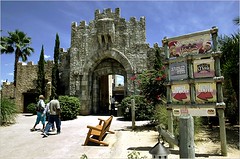 Doug Mills/The New York TimesHoly Land Experience, a biblical theme park in Orlando, Fla., went to Gov. Jeb Bush and the Florida Legislature to win an exemption after county authorities determined that the park should be taxable.
Doug Mills/The New York TimesHoly Land Experience, a biblical theme park in Orlando, Fla., went to Gov. Jeb Bush and the Florida Legislature to win an exemption after county authorities determined that the park should be taxable.I never managed to mention the New York Times series last week about religious-based exemptions from various laws and regulations. Still accessible online is the editorial from the Monday paper, "Faith-based profits," as well as some letters to the editor. From the editorial:
Religious institutions should be protected from excessive intrusion by government. Judges should not tell churches who they have to hire as ministers, or meddle in doctrinal disputes. But under pressure from politically influential religious groups, Congress, the White House, and federal and state courts have expanded this principle beyond all reason. It is increasingly being applied to people, buildings and programs only tangentially related to religion.
In its expanded form, this principle amounts to an enormous subsidy for religion, in some cases violating the establishment clause of the First Amendment. It also undermines core American values, like the right to be free from job discrimination. It puts secular entrepreneurs at an unfair competitive disadvantage. And it deprives states and localities of much-needed tax revenues, putting a heavier burden on ordinary taxpayers.
Like most special-interest handouts, these privileges exist in large part because the majority is not aware, or is not being heard. With property taxes growing ever more burdensome, it is likely that localities will start to give religious exemptions closer scrutiny. People who care about discrimination-free workplaces, the right to unionize and children’s safety should also start to push back.
I found a way to back into the articles, although you have to be a registered user of the NYT website:
In God's Name
Part 1: Favors for the Faithful
Part 2: Limiting Workers' Rights
Part 3: Giving Exemptions
Part 4: Religion-Based Tax Breaks
I have no problem with religion, and even with accommodating church-related parking on Sundays, but I do have problems with acquisitive land policies which can destabilize urban neighborhoods through deliberate squalor production--to aid further land purchases at "the right price." And parking instead of residential use can rarely be supported.
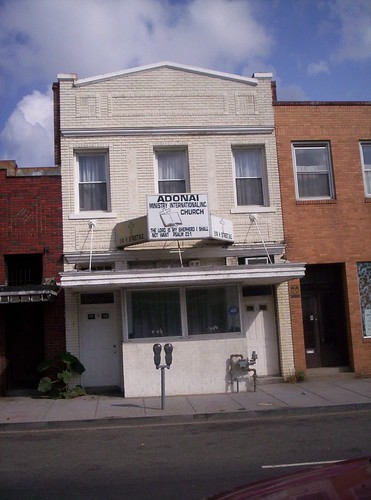 In all the years I lived one block from this "church," I could count on one hand the number of times I saw it in operation.
In all the years I lived one block from this "church," I could count on one hand the number of times I saw it in operation.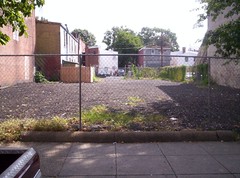 Pilgrim Baptist Church allowed the buildings previously extant on this site to deteriorate, in favor of their plans to build a mid-block parking lot. While the church doesn't meet the regulations to put on parking lot on this site, according to last week's Washington Post, they received a building permit to construct 15 parking spaces on this site, which they have been using for a parking lot illegally in the interim.
Pilgrim Baptist Church allowed the buildings previously extant on this site to deteriorate, in favor of their plans to build a mid-block parking lot. While the church doesn't meet the regulations to put on parking lot on this site, according to last week's Washington Post, they received a building permit to construct 15 parking spaces on this site, which they have been using for a parking lot illegally in the interim.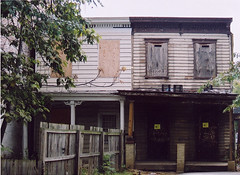 The neglected buildings previously extant. Photo by Peter Sefton.
The neglected buildings previously extant. Photo by Peter Sefton.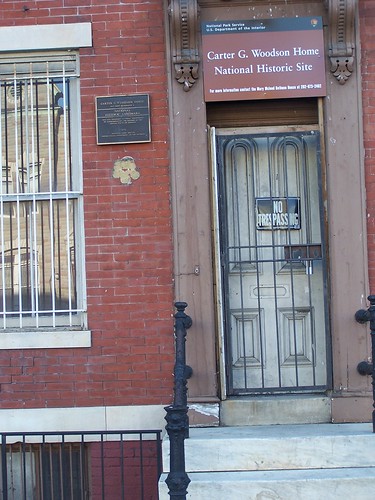 Shiloh Baptist Church owned this landmark significant to African-American history, previously it was the Washington DC home and headquarters of Carter G. Woodson, the founder of the Association for the Study of Negro Life & History in 1915. The building deteriorated under the Church's "care," to the point where the building is uninhabitable. The building was recently purchased by the National Park Service.
Shiloh Baptist Church owned this landmark significant to African-American history, previously it was the Washington DC home and headquarters of Carter G. Woodson, the founder of the Association for the Study of Negro Life & History in 1915. The building deteriorated under the Church's "care," to the point where the building is uninhabitable. The building was recently purchased by the National Park Service.Index Keywords: church-state



0 Comments:
Post a Comment
<< Home